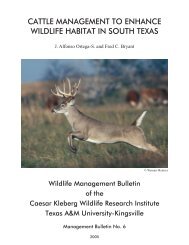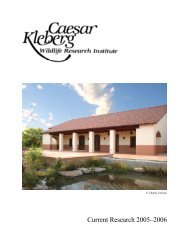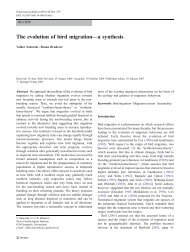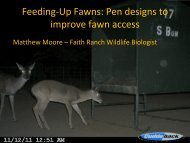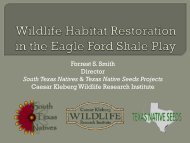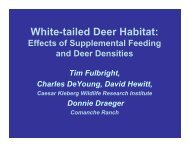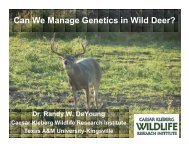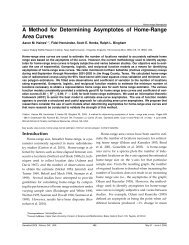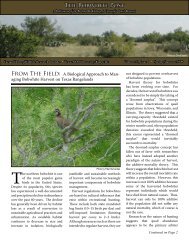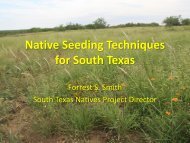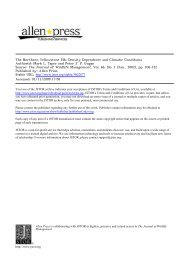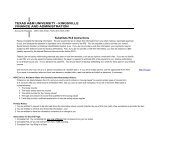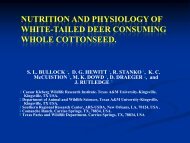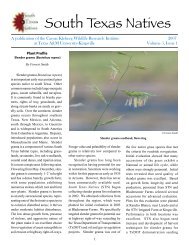south texas wildlife - Caesar Kleberg Wildlife Research Institute ...
south texas wildlife - Caesar Kleberg Wildlife Research Institute ...
south texas wildlife - Caesar Kleberg Wildlife Research Institute ...
You also want an ePaper? Increase the reach of your titles
YUMPU automatically turns print PDFs into web optimized ePapers that Google loves.
CKWRI congratulates Karen for<br />
her conservation service and welldeserved<br />
recognition by the Rotary<br />
Club of Corpus Christi. ~<br />
EAGLE FORD SHALE AND<br />
COUGAR POPULATIONS<br />
by Michael Tewes<br />
Former CKWRI Grad Student<br />
Receives Promotion<br />
One of CKWRI’s former<br />
graduate students Jennifer Mock<br />
Schaeffer was recently promoted<br />
to Government Affairs Director by<br />
the Association of Fish and <strong>Wildlife</strong><br />
Agencies (AFWA). Schaeffer will<br />
oversee and direct the legislative<br />
work of AFWA before the U.S. Congress,<br />
and the public policy work of<br />
AFWA before the federal Executive<br />
Branch agencies.<br />
Since joining AFWA in May<br />
2002, Jennifer has served as the<br />
Multistate Conservation Grant Program<br />
Coordinator<br />
and<br />
most recently<br />
as AFWA’s<br />
Agriculture<br />
Conservation<br />
Policy Analyst<br />
(Farm<br />
© Laura MacLean<br />
Jennifer Mock Schaeffer,<br />
former graduate<br />
student of CKWRI at<br />
TAMUK, was recently<br />
promoted to Government<br />
Affairs Director<br />
by the Association<br />
of Fish and <strong>Wildlife</strong><br />
Agencies.<br />
Bill). She also<br />
has provided<br />
staff support<br />
for AFWA’s<br />
Agricultural<br />
Conservation<br />
Committee<br />
and its<br />
11 working<br />
groups.<br />
Jennifer received a Bachelor of<br />
Science degree in Agriculture with<br />
a major in Range and <strong>Wildlife</strong> Management<br />
and a minor in Biology at<br />
Texas A&M University-Kingsville.<br />
She also received her Master of<br />
Science degree at Texas A&M<br />
University-Kingsville in Range and<br />
<strong>Wildlife</strong> Management, working with<br />
Dr. Michael Tewes on wild cats. ~<br />
Consider giving a tax-deductible<br />
donation to CKWRI<br />
How will cougars fare in South<br />
Texas Breeding populations of<br />
cougars presently occur in South<br />
Texas and the Trans-Pecos region<br />
of western Texas. Previous research<br />
has suggested that the South Texas<br />
cougar population is relatively small<br />
and isolated.<br />
The Eagle Ford Shale development<br />
involves an increase in human<br />
activity affecting areas that previously<br />
were relatively undisturbed.<br />
Because the shale play overlaps<br />
some of the best cougar habitat in<br />
South Texas, this development may<br />
impact this wild cat.<br />
The basis for this emerges from<br />
our research at the CKWRI in which<br />
we identified possible vulnerability<br />
of the South Texas cougar population.<br />
Small populations are often<br />
subjected to threats that are more<br />
easily absorbed by larger populations.<br />
Also, inbreeding is more<br />
likely in small populations.<br />
Our graduate student, Joe<br />
Holbrook, found low levels of<br />
genetic diversity in cougar samples<br />
from South Texas. During the past<br />
50 years in South Texas, genetic<br />
diversity has dropped by 9% and<br />
the “effective population size” of<br />
cougars has declined by 50%. The<br />
West Texas population has remained<br />
stable and is part of a larger population<br />
with habitat that extends into<br />
Mexico, New Mexico, and the<br />
Editor’s Note: Dr. Michael Tewes holds The Frank<br />
Daniel Yturria Endowed Chair for Wild Cat Studies<br />
at CKWRI and is a Regents Professor at Texas<br />
A&M University-Kingsville.<br />
Courtesy of Texas Parks and <strong>Wildlife</strong><br />
Rocky Mountains. Our genetic findings<br />
have confirmed that dispersal<br />
can occur periodically into and<br />
out of the South Texas population.<br />
However, the low number of successful<br />
dispersers may be too few to<br />
maintain genetic diversity.<br />
Another study that we have completed<br />
was led by Dr. John Young<br />
who used population modeling to<br />
assess the survival chances of the<br />
small cougar population in South<br />
Texas. Results suggested potential<br />
threats for cougar survival in this<br />
region. Variation in population<br />
reproduction, survival, and habitat<br />
conditions, including drought, which<br />
is frequent, could threaten cougar<br />
survival in South Texas.<br />
Our additional research at the<br />
CKWRI used an ecological niche<br />
computer model that showed most<br />
of the likely habitat for cougars in<br />
South Texas occurs in the western<br />
portion of the region. This habitat<br />
is not wide-spread or extensive, but<br />
generally localized, which is another<br />
reason for concern.<br />
Much of this habitat coincides<br />
with the historic and current assessments<br />
of cougar distribution and a<br />
belief that a population core occurs<br />
in the west-central area of South<br />
Did You Know<br />
The red-winged blackbird has a polygynous mating strategy (1 male<br />
to several females). (Handbook of Birds of the World, Volume 16)<br />
Ord’s kangaroo rats are considered nocturnal and are most active<br />
on dark, cloudy nights. (A Field Guide to Mammals of North America North of Mexico,<br />
F.A. Reid)<br />
3



